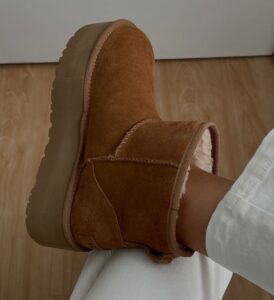The easiest definition of cultural appropriation is unrecognised adaptation of a component of one culture by people that do not identify with that culture.
Cultural appropriation is theft in a sense that it lifts cultural aspects from underrepresented groups of people.
Cultural appropriation can lead to exploitation and injustice. Most of the time, cultural appropriation goes unacknowledged which makes it a bigger problem than it actually really is.

Uggs is a generic term for unisex sheepskin boots that have been extensively used in Australia for over 200 years.
Uggs are conventionally made of two-sided sheepskin. Interior of the boot is made from a fleece lining and synthetic sole.
It’s still not known if the use of uggs by a person of colour is cultural appropriation or not.
WHAT IS THE HISTORY:
Uggs came into being approximately a hundred years ago. Back in the day, uggs were predominantly used to provide warmth and comfort during the winter season.
Their ability to resist wool yolk made them an indispensable part of a shearer’s life. However, in Australia, uggs are largely linked with an eccentric fashion sense and unrefined behaviour.
While uggs are becoming an essential part of casual wear all around the world, they are still not considered fashionable in their countries of origin.
A huge number of people consider the use of uggs by a person of colour as cultural appropriation. This is due to the fact that uggs have been largely associated with white people since their time of origin.
Ugg boots cater to the winter season perfectly. This is also why they have been widely associated with white people.

Since the time they came into being and till now, uggs are majorly used by the native people of Australia and New Zealand.
Their ability to provide protection from snow is another reason why uggs have largely been associated with white people belonging to colder areas.
Many claims have been made about the origin of ugg boots, most of which are linked to the Australian people. However, the origin of ugg boot style as well as the generic term ugg still remains unclear.
IS IT OFFENSIVE?
Cultural appropriation of any and every kind is offensive and should not be encouraged at any cost.
Cultural appropriation is downright ridiculous because it offers nothing in return of the items being borrowed.
Some people define cultural appropriation as trying other people’s identities as costumes while they struggle for acceptance.
Uggs may have become popular because of the comfort they provide, they still don’t fall under the category of chic luxury items.
Cultural appropriation of uggs is offensive because no one with a good fashion sense would invest in a pair of ugg boots.
Cultural appropriation is a threat to many communities, especially to minorities all around the world.
Cultural appropriation is usually considered offensive by the people from whose culture elements are unintentionally adapted by people not belonging to that community.

However, associating uggs with white people is not only offensive, but downright incorrect.
Although official manufacturing of uggs started somewhere around the 70s, it is believed that uggs were worn by people in rural Australia during the 1920s.
Labeling the use of uggs as a way of promoting cultural appropriation is unjustified.
IS IT RUDE OR DISRESPECTFUL?
Cultural appropriation is considered disrespectful all around the world. Cultural appropriation violates the sanctity of many cultural traditions and norms.
Many people believe that unintentional changes are made to cultural components when they are detached from their original cultural context.
Cultural appropriation is disrespectful because it results in exploitation of sacred teachings. This exploitation hurts the sentiments of the pioneers of that cultural teaching.
Many people believe that uggs are not cultural appropriation because northern cultures all around the world make use of fur lined boots to stay warm.
A thorough analysis should be done before labelling something as cultural appropriation.
Due to unwanted and unjustified claims of calling uggs cultural appropriation, many people of colour who genuinely needed uggs to stay warm and comfortable have been deprived of it.
Uggs have a need based origin. They were invented to fight off extremely cold weather. That’s why no specific community can keep the right of wearing uggs to themselves.
Just like cold weather is not restricted to a specific part of the world, uggs should also not be considered a specific community’s or country’s property.
Uggs would be considered cultural appropriation if they were known as tribal boots instead of ugg boots.
Cultural appropriation of historically valuable items and traditions is extremely rude and disrespectful.
Cultural appropriation leads to exploitation of sacred teachings and culturally important practices for profit.
WHAT IS THE RIGHT WAY TO GO ABOUT IT:
There are many ways to avoid cultural appropriation. First of which is to be able to differentiate between cultural appropriation and cultural appreciation.
While cultural appropriation leads to distortion and manipulation of culturally distinct items, cultural appreciation helps in building cross culture connections.

In order to steer clear of cultural appropriation, avoid adopting any behaviour that stereotypes or insults members of another culture.
Cultural appropriation can also be averted by avoiding the use of clothes, jewellery, or art that has any religious or spiritual significance in a religion that you don’t follow.
Give credit to the origin of an item that you borrow or adopt from another culture. This requires a thorough learning and appreciation of that specific culture.
If you really want to buy a pair of uggs but are afraid of promoting cultural appropriation, you should buy it from indigenous people of Australia or New Zealand.
This way ugg boots can be utilised by people that genuinely need it without hurting the sentiments of aboriginal Australian people.
If you plan on manufacturing uggs in your own country, make sure to give credit to their true origin.




